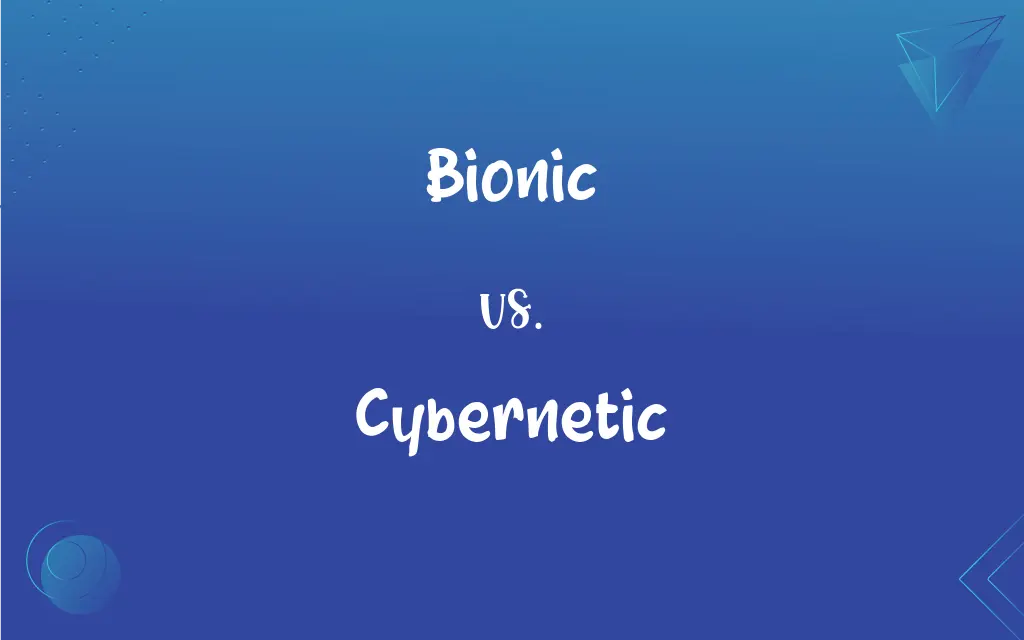Bionic vs. Cybernetic: What's the Difference?
Edited by Aimie Carlson || By Janet White || Updated on September 29, 2023
Bionic refers to the enhancement of biological functions through artificial means, often mimicking natural systems. Cybernetic refers to the study and application of systems, control, and communication in both machines and living organisms.

Key Differences
Bionic enhancements aim to replace or augment biological capabilities, typically by mimicking natural systems. These could include prosthetic limbs that move like real limbs. Cybernetic, on the other hand, focuses on the principles of control and communication in systems, both mechanical and biological. It might involve robotic automation or neural networks.
Bionic technology tends to focus on the individual, often aiming to improve a human's specific abilities or compensate for disabilities. Cybernetic research usually involves broader systems, studying how different parts of a system interact, whether it's within a machine, a living organism, or between both.
While bionic usually implies a fusion of the biological and the mechanical, the emphasis is on enhancing biological functions. Cybernetic projects might not necessarily be aimed at enhancement but could focus on understanding and modeling existing systems for better control and efficiency.
Both bionic and cybernetic involve interdisciplinary research, but their applications can be quite different. Bionic technologies often find applications in healthcare, for prosthetics or sensory aids. Cybernetic principles are used in various fields, including robotics, computer science, and even economics.
In popular culture, bionic often conjures images of superhumans with extraordinary abilities, courtesy of advanced artificial implants or limbs. Cybernetic often evokes ideas of futuristic robots or complex systems that can self-regulate and adapt.
ADVERTISEMENT
Comparison Chart
Primary Focus
Enhancement of biological functions
Study of control and communication
Application Scope
Individual abilities
Systems-level interactions
Aim
Mimic natural systems
Control and model systems
Common Applications
Healthcare, prosthetics
Robotics, computer science
Cultural Perception
Superhuman abilities
Futuristic, self-regulating systems
ADVERTISEMENT
Bionic and Cybernetic Definitions
Bionic
Related to artificial systems mimicking natural ones.
The bionic leaf effectively converts sunlight into fuel.
Cybernetic
Concerned with the study of systems control and communication.
Cybernetic research has advanced the field of robotics.
Bionic
Denotes the integration of mechanical elements into biological systems.
Bionic implants can help restore lost hearing.
Cybernetic
Used to describe self-regulating systems that adapt and change.
The cybernetic organism could heal its own wounds.
Bionic
Popularly used to describe someone with extraordinary abilities due to technological enhancements.
The bionic man could run faster than any Olympic athlete.
Cybernetic
Frequently associated with theories of control and information processing.
Cybernetic theories have applications in various scientific domains.
Bionic
Pertaining to the use of artificial devices to replace or enhance biological functions.
The bionic arm allowed her to lift objects effortlessly.
Cybernetic
Involves automated control systems in machinery or organisms.
The cybernetic implant helped him control his prosthetic limb.
Bionic
Implies human enhancement through technology.
His bionic eyesight can zoom in on distant objects.
Cybernetic
Encompasses feedback loops in engineered and biological systems.
Cybernetic principles help stabilize the financial market.
Bionic
Of or relating to bionics.
Cybernetic
The theoretical study of communication and control processes in biological, mechanical, and electronic systems, especially the comparison of these processes in biological and artificial systems.
Bionic
Having anatomical structures or physiological processes that are replaced or enhanced by electronic or mechanical components.
Cybernetic
Of or relating to cybernetics—the mathematical study of communication and control in living organisms or machines.
Bionic
Having extraordinary strength, powers, or capabilities; superhuman.
Cybernetic
Of or relating to computers and internet.
Bionic
(not comparable) Related to bionics.
Cybernetic
Of or relating the principles of cybernetics;
Cybernetic research
Bionic
(of a biological organism) Having been enhanced by electronic or mechanical parts; cyborg.
Bionic
Superhuman.
Bionic
Of or relating to bionics
Bionic
Having particular physiological functions augmented or replaced by electronic or electromechanical components
FAQs
What does bionic mean?
Bionic refers to the enhancement or replacement of biological functions through artificial means.
What does cybernetic mean?
Cybernetic refers to the study of control, communication, and information in machines and living organisms.
Are cybernetic systems always bionic?
No, cybernetic systems may not have biological elements and can be entirely mechanical or informational.
Can bionic technology make someone superhuman?
While bionic technology aims to enhance abilities, the term "superhuman" is often a subjective or cultural interpretation.
Is cybernetic research limited to robotics?
No, cybernetic principles apply to a broad range of disciplines including biology, economics, and computer science.
Are bionic enhancements safe?
Safety depends on the technology and its application; bionic devices for medical use undergo rigorous testing.
Are all bionic devices cybernetic?
Not necessarily; while bionic devices may incorporate control systems, they focus primarily on mimicking or enhancing biological functions.
Are cybernetic systems self-aware?
Generally, no. Most cybernetic systems are not self-aware; they operate based on pre-defined rules and feedback.
What are some applications of cybernetics?
Applications include robotics, automated control systems, artificial intelligence, and even theories in economics.
How do bionic enhancements work?
Bionic enhancements work by mimicking or augmenting biological functions through artificial devices or systems.
Who uses bionic technology?
Bionic technology is often used in healthcare for prosthetics, implants, and other assistive devices.
Is bionic technology expensive?
Costs can vary widely based on the complexity and application of the technology.
What do cybernetic systems study?
Cybernetic systems study how elements within systems communicate and control each other.
Are bionic and cybernetic terms interchangeable?
No, while related, they focus on different aspects—bionic on biological enhancement, and cybernetic on systems control and communication.
Can cybernetic systems learn?
Some cybernetic systems incorporate machine learning algorithms to adapt and improve over time.
About Author
Written by
Janet WhiteJanet White has been an esteemed writer and blogger for Difference Wiki. Holding a Master's degree in Science and Medical Journalism from the prestigious Boston University, she has consistently demonstrated her expertise and passion for her field. When she's not immersed in her work, Janet relishes her time exercising, delving into a good book, and cherishing moments with friends and family.
Edited by
Aimie CarlsonAimie Carlson, holding a master's degree in English literature, is a fervent English language enthusiast. She lends her writing talents to Difference Wiki, a prominent website that specializes in comparisons, offering readers insightful analyses that both captivate and inform.































































